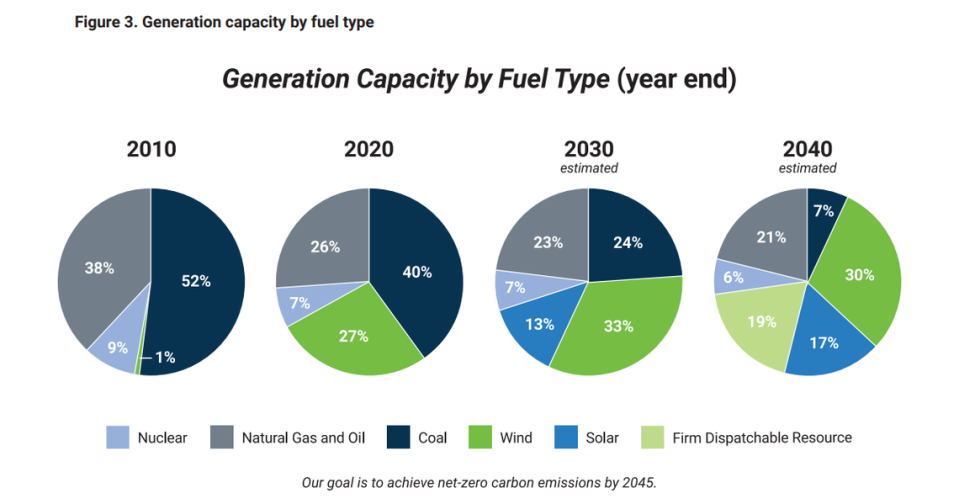Kansas City wants to move away from fossil fuels. Here’s what Spire and Evergy say
Spire and Evergy, the two largest private utility monopolies in Kansas City, have some reservations about the city’s forthcoming climate action plan. The companies each submitted comments privately to the city’s Office of Environmental Quality in recent weeks.
Among their objections were the climate plan’s commitments to move away from fossil fuels like coal and natural gas to heat and power Kansas City homes. The Star has acquired their statements through a Sunshine Act request. Here’s what they say.
Continuing to rely on natural gas
Spire’s letter opposed the climate plan’s objectives of reducing reliance on natural gas as a power source and moving toward a greater proportion of electric power.
“We have concerns with the current draft of the CPRP because it fails to recognize the benefits of natural gas to the region,” wrote Scott Weitzel, Spire Missouri’s vice president of regulatory and government affairs. “Clean, efficient natural gas is critical to meeting the energy needs of Kansas City and Missouri.”
Some context: According to the U.S. Energy Information Administration, natural gas usage accounted for 36% of energy-related CO2 emissions in the U.S. in 2020. While burning natural gas produces fewer greenhouse gas emissions than other fuels like coal or petroleum, it still plays a role in the ongoing climate crisis.
Spire is the only natural gas provider to the Kansas City region, where it says it serves “several hundred thousand” customers.
Opposing the shift towards electric power
Spire went on to argue that natural gas is more reliable than electricity is, citing far fewer service outages and the company’s ability to keep customers warm during Winter Storm Uri last year. It also argued that the plan would make the city more reliant on electricity that currently comes from environmentally harmful fuels like coal and oil.
Spire also took issue with proposals like supporting renewable energy expansions and updating existing buildings and appliances to run on electricity, citing HB734. This 2021 Missouri law prohibits municipalities from banning utility services based on the energy source they provide.
While HB734 effectively preempts any Kansas City ordinances that would explicitly ban natural gas or other energy types, it does not stop the city from supporting electrification measures that would make renewable energy more attractive to consumers. The city plans to accompany its electrification push with a transition towards renewable electricity.
Read Spire’s full 22-page statement here:
Keeping a coal-burning power plant open
Evergy, Kansas City’s major provider of electricity, expressed agreement with some elements of the Climate Protection and Resiliency Plan. Among them were the city’s goals of transitioning to electric vehicles and boosting programs that allow households with rooftop solar panels to sell their excess electricity back to the power grid.
However, Evergy objected to several measures that would compel it to accelerate its own transition towards renewable power. Among these were the proposal to close its Hawthorn power plant, a coal-burning power facility located northeast of downtown, by 2025.
“Coal plants provide a valuable, dispatchable resource for the system, balancing the intermittency of renewables and ensuring reliability for our customers,” the company wrote.
Closing the Hawthorn plant is a major goal of environmental groups around the city, who say it causes harmful air pollution and slows the city’s transition to renewable energy. Evergy argues that the issue of its closure is a decision for its state regulator, the Missouri Public Services Commission, rather than for the city in which the plant operates.

Evergy repeatedly emphasized their own Integrated Resource Plan (IRP), an internal agenda with a stated goal of net-zero carbon emissions by the year 2045.
“Our IRP process allows us to responsibly manage this transition and take advantage of a diverse fuel mix for our customers,” the company stated. Their IRP projects a fuel mix in 2040 that derives less than half of its power from wind and solar energy, while still using oil, natural gas and coal for at least 28% of its power.
A recent report from a UK-based climate policy think tank found that many of Evergy’s policies are not aligned with the Paris Climate Agreement, ranking it 18th out of the 25 largest utilities in the country.
Read Evergy’s full statement here:
Do you have more questions about sustainability initiatives in Kansas City? Ask the Service Journalism team at kcq@kcstar.com.

